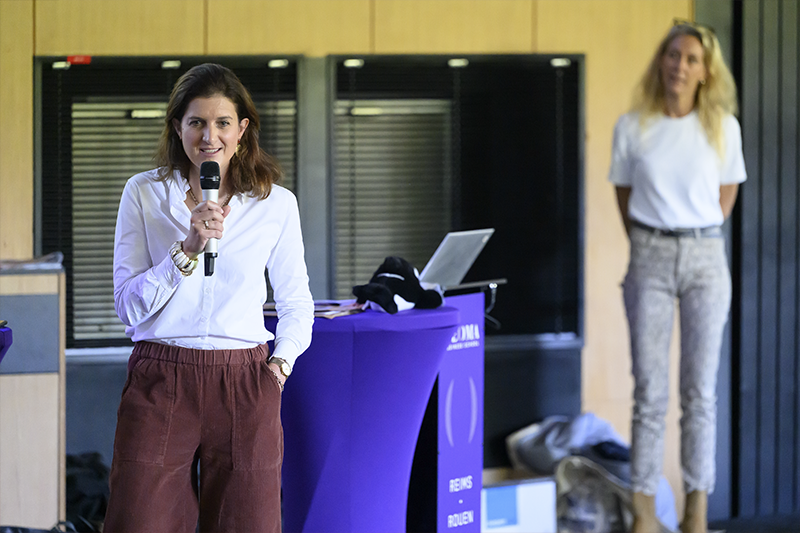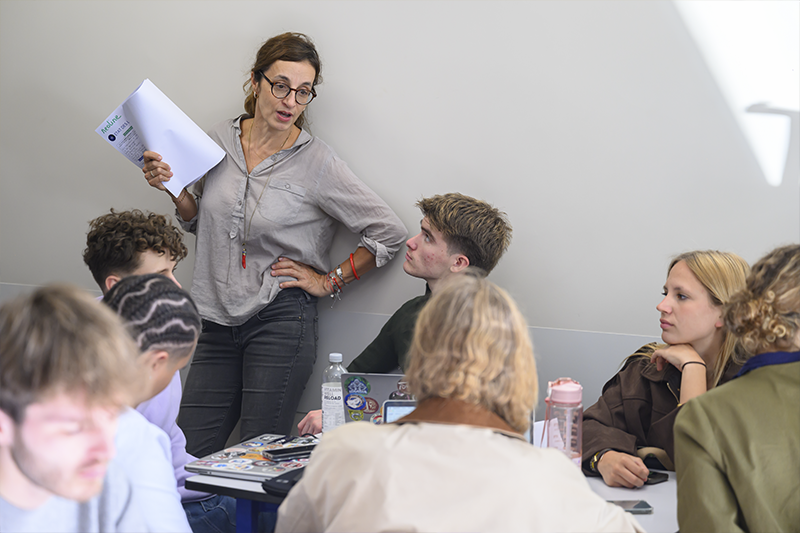
Master in Management
With the Master in Management become a top-level business leader, capable of meeting the expectations of organisations all over the world.
2 to 3 years
Reims, Rouen
Published on 06/10/2025
For the Year of the Sea, NEOMA Business School put on a seminar on oceans for students on Master 1 of the Master in Management. Over 48 hours, they were immersed in issues of business and respect for the living world. The event was certified by UNESCO and supported by France Télévisions. Here we look back at those two intense days.
The oceans are at the heart of the environmental issue; ocean warming results in climate upheavals and modifications of ecosystems. “As well as these consequences, major social issues are also emerging. Our objective was to inspire students to become involved with meaningful careers. This generation can construct business that respects the living world without destroying the planet,” explained the two organisers in their introduction. They are Elise Bruchet, Head of Social and Environmental Transition at NEOMA, and Laure Lelasseux, Assistant Professor in Sustainability.
To get the NEOMA students involved even more, Elise Bruchet and Laure Lelasseux devised a hackathon-type format to help develop rigour in researching serious information, to link with current affairs and CSR commitments, and to plunge the students straight into reality.

“The project fits fully within our CSR strategy and illustrates our approach to the ecological transition: to stir our students to action to meet the great challenges of our time, without hopelessness but with an ambitious vision of our ability to change things,” points out Delphine Manceau, Dean of NEOMA.
The students had ‘48 hours to think differently’ and in particular to produce a 90-second video that would resonate as an advocate for the oceans.
They worked with seven companies (see below), all committed to striving for a virtuous world and business on behalf of the oceans, in their work in the sectors of insurance, luxury, cosmetics and transport.
The students, divided into teams, chose a company, then studied its business model and stakeholders, its colleagues and all the transactions that take place within their ecosystem… That provided the material to write the script of a video aimed at developing cooperation, broadening its impact and raising awareness with partners.
The partner companies were: AXA Climate, Phytomer, Sailcoop, MerConcept, Neoline, Océan VOX, and Océans connectés.

The students produced a total of 132 videos. Eight of these were selected for the finals that took place in Reims on 22 September and in Rouen on 29 September.
“We are extremely proud of the intellectual rigour and creativity of our students,” commented Élise Bruchet. “One of our objectives for this new academic year was to teach students to be amazed in order to construct business that is more respectful of the living world.”
This teaching format, jointly devised by the Department of Social Transition and the Faculty, embodies the will of NEOMA to invent new ways of teaching and learning:
We learn by action,
We learn to think differently,
We learn to feel to understand better.
These two conference days highlighted innovative teaching, in which academic rigour and creative commitment come together to train managers capable of combining economic performance and environmental responsibility.
To demonstrate their commitment to the environment, NEOMA invited activists, sportspeople, entrepreneurs, graduates and members of voluntary groups for a ‘shock’ conference.
“When you do things together, that helps maintain motivation, joy and a desire to act. And when your energy flags a bit, other people help you keep going. That’s why I strongly recommend you join voluntary groups and movements. It’s important to feel you are acting together, as part of a group, and that way you’ll make the greatest impact. The key now is to act together. That also makes you feel really good,” said Manon Chevalier, graduate of the Master in Management, businesswoman and ambassador for Women For Sea.
“There’s something I learned in surfing, that I apply to the rest of my life, and it’s also true of ecology, and that’s that you can’t control very much. In surfing, you can’t control the ocean, or your adversaries. So when I’m preparing, I focus on my own energy, on what I can control myself, and on what I can do,” shared Ainhoa Meiceaga, surfer and ambassador for PureOcéan.
“I chose to become involved in large companies. You can stir things up from the inside. We adapt our CSR training in the company according to the level of seniority. Otherwise, it would be impossible to get the whole of the organisation on board,” reports Pauline Sauri, graduate of the MSc in Sustainability at NEOMA and now CSR Head of Mission at AXA.